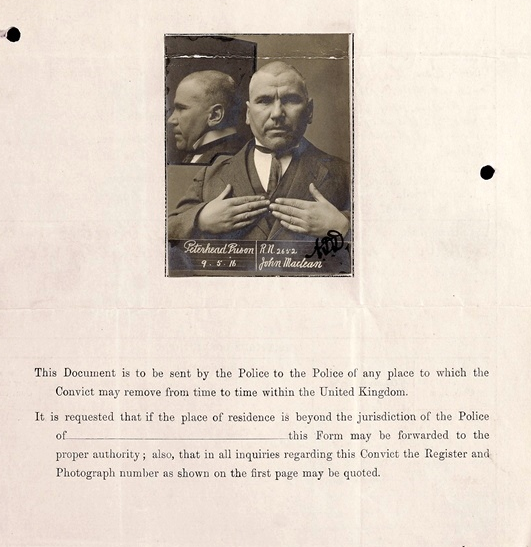November 2017 marks the 100th anniversary of the Bolshevik Revolution in Russia in 1917. The revolution shocked the great powers of the day and inspired supporters around the world, including in Scotland. Their stories, like those of millions of people from Scotland’s past, can be found within the NRS archives.
John Maclean (1879-1923) was a schoolteacher in Glasgow and a prominent socialist, part of what became known as the ‘Red Clydeside’ movement. He was notable for his outspoken opposition to the First World War, advocating a combination of strikes and political action as the only way to halt the war and protect workers’ rights.In November 1915, Maclean was charged under the Defence of the Realm Act 1914 for uttering statements calculated to prejudice recruiting. He was found guilty, resulting in his dismissal from his teaching post in Glasgow.

Maclean became a full-time Marxist lecturer and organiser and continued with his anti-war agitation. He was again arrested in 1916 and charged with sedition in relation to anti-conscription speeches made at open-air meetings. He was sentenced to three years penal servitude, eventually serving fourteen months.
On his release from prison, Maclean renewed his anti-war activities, regularly lecturing to miners and other workers. He became an enthusiastic supporter of the October 1917* Bolshevik Revolution and was appointed Bolshevik consul for Scotland in 1918, a position that was never formally recognised by the British government.
Maclean was again tried in May 1918, conducting his own defence against charges of attempting to cause mutiny, sedition and disaffection amongst the civilian population. He was found guilty and sentenced to five years’ penal servitude. While in Peterhead prison, he went on hunger strike and was force-fed by the prison authorities. He was released after the 1918 Armistice and although he was granted a Royal Pardon, refused to accept it.
Maclean died on 30 November 1923, aged 44, his health ruined by regular periods of imprisonment and his treatment while there. At his funeral, thousands of people lined the streets of Glasgow to view his funeral cortege.
 On the centenary of Maclean’s birth in 1979, the government of the USSR issued a stamp bearing his image.
On the centenary of Maclean’s birth in 1979, the government of the USSR issued a stamp bearing his image.
NRS holds a wealth of criminal justice records that tell us much about Scotland’s past. Digital images of prison files relating to John Maclean are now available for public viewing at our Historical Search Room.
You can also come face-to-face with Scotland’s criminal past in our new exhibition Rogues Gallery: Faces of Crime 1870-1917, free to visit at General Register House until 1 December 2017.
*The events of 7-8 November 1917 are commonly referred to as the “October Revolution” because Russia was still using the Julian Calendar at that time. In the old style calendar, the revolution began on 25 October.
Bruno Longmore
Head of Government Records
National Records of Scotland